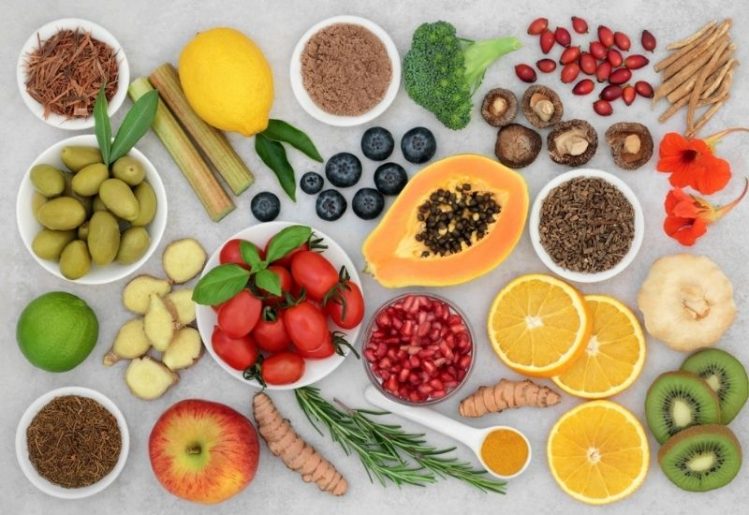Examining the Health Benefits of Polyphenols
The many health benefits of polyphenols cannot be overstated. This category of plant compounds has been shown to improve a variety of health outcomes. Here is what you need to know about the power of polyphenols and how you can harness these benefits through a good diet and a quality supplementation routine.
Types of Polyphenols
 Polyphenols are a specific type of compound that occur naturally in plant foods, including fruits, vegetables, tea, wine, dark chocolate, herbs and spices. Because they have the ability to act as antioxidants, polyphenols are instrumental in neutralizing the dangerous free radicals that damage cells and raise your risk of developing a host of diseases.
Polyphenols are a specific type of compound that occur naturally in plant foods, including fruits, vegetables, tea, wine, dark chocolate, herbs and spices. Because they have the ability to act as antioxidants, polyphenols are instrumental in neutralizing the dangerous free radicals that damage cells and raise your risk of developing a host of diseases.
In addition, because polyphenols have been shown to lower inflammation levels in the body, they may also be useful in keeping chronic illnesses at bay. There are four major categories of polyphenols:
Flavonoids
Compromising roughly 60 percent of all polyphenols, flavonoids encompass compounds such as catechizes, quercetin, kaempferol and anthocyanins.
Polyphenolic Amides
These types of polyphenols are what you would find in chili peppers and oats.
Phenolic Acids
Accounting for about 30 percent of all polyphenols, phenolic acids are also known as stilbenes and lignans. You will find these compounds in a variety of grains, seeds, fruits and vegetables.
Miscellaneous Polyphenols
In addition to the three main categories of polyphenols, there are a variety of these compounds that do not fall under a particular designation. The most common of these miscellaneous polyphenols include the resveratrol found in red wine, curcumin in the turmeric spice and the ellagic acid in berries.
Exploring the Many Health Benefits of Polyphenols
Scientists are learning more useful information all the time about how polyphenols work to deliver significant health benefits. Here are just a few of the benefits of making the intake of polyphenols a part of your regular health routine.
Prevent COVID-19 Infection
Some preliminary research has shown that the polyphenols in green tea may help to regulate the gut microbiota, potentially guarding against COVID-19 infection. The antioxidant qualities associated with polyphenols also may block the oxidative stress that happens when exposed to COVID-19, mitigating the odds that it begins to replicate and invade the body.
Reduce Incidence of Cancer
Because antioxidants have been repeatedly linked to the prevention of cancer, it makes sense that polyphenols would also provide this protection. The active chemicals in the plant compounds work to neutralize free radicals, reversing the damage that they bring to cells.
Boost Heart Health
Who doesn't want a stronger heart? Polyphenols have been demonstrated to lower harmful LDL cholesterol, protecting the heart from disease in the process. Sufficient intake of polyphenols can also improve the health and function of blood vessels and circulation, helping to support healthy blood pressure readings.
Stabilize Blood Sugar Levels
The family of flavonoids have been associated with stable blood sugar levels as they boost insulin secretion, stabilize glucose metabolism and guard against cell death. This research is promising news for those individuals hoping to keep their Type 2 diabetes in check.
Improve Neurological Health Outcomes
Polyphenols may also be of assistance in protecting the brain from the natural aging process and the degenerative diseases that often accompany this season in life. This includes protection against Alzheimer's and the first signs of dementia. New research has also shown promise in how doctors can use polyphenols to protect the body from multiple sclerosis, Huntington's disease, Parkinson's disease and stroke.
Support Healthy Skin
The plentiful antioxidants in these compounds can work to reduce the risk of skin cancer at the hands of UV damage. This will also deliver a more radiant complexion and slow down the aging process of the skin.
How to Boost Your Intake of Polyphenols
 There are a number of ways that you can ensure that you are taking in plenty of polyphenols. The first step is to increase your intake of these substances by focusing your diet on foods that provide them in high quantities. You will find polyphenols in the greatest quantities in tea, dark chocolate, red wine and berries.
There are a number of ways that you can ensure that you are taking in plenty of polyphenols. The first step is to increase your intake of these substances by focusing your diet on foods that provide them in high quantities. You will find polyphenols in the greatest quantities in tea, dark chocolate, red wine and berries.
Other good sources of polyphenols include fruits such as apples, grapes, plums, pears and citrus fruits. Polyphenols are also present in vegetables such as artichokes, carrots, spinach, potatoes and asparagus. You can also find polyphenols in a variety of legumes, grains, nuts and seeds. Increasing your intake of herbs and spices is another great way to incorporate more polyphenols into your diet.
Many people also lean on the power of supplements to ensure that their diet is rich in polyphenols. This is an easy and convenient way to take in the quantity of polyphenols needed for optimal health. Be sure to read the label carefully when deciding what supplement to use for your polyphenol needs.
When it comes to guarding your overall health and wellness, every little bit of preventative action can help. Making polyphenols a cornerstone of your nutritional plan is a good start.





